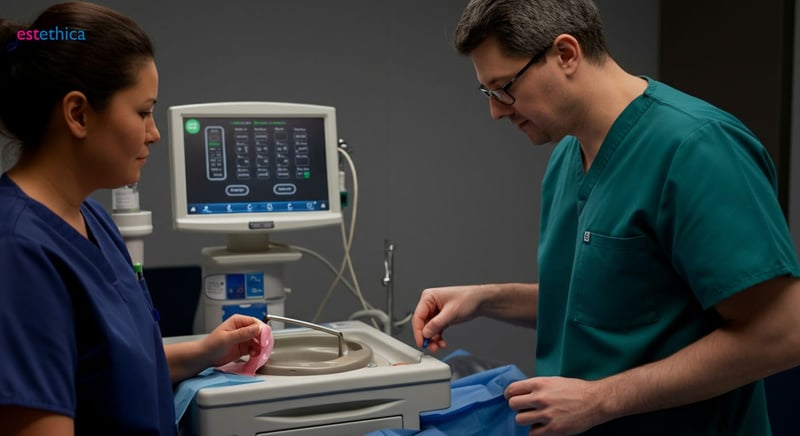Bariatric Breakthrough: Your Body's Transformation Journey
Discover bariatric surgery with estethica – your first step towards a healthier, lighter you.
Bariatric surgery is not just a procedure but a gateway to a healthier life. It represents a breakthrough for many who have struggled with obesity. This article explores bariatric surgery's transformative journey, offering insights into its benefits, different surgical paths, and life post-surgery.
Decoding Bariatric Surgery: Is It Right for You?
Understanding the Eligibility Criteria for Bariatric Surgery
Bariatric surgery, also known as obesity surgery, is designed to assist individuals in their journey to lose weight and enhance their overall quality of life. Determining whether it is the right option for you requires careful consideration of several factors. These include your Body Mass Index (BMI), your history of prior weight loss attempts, and any existing health conditions you may have. Doctors rely on established guidelines, such as the NICE bariatric surgery guidelines, to thoroughly evaluate potential candidates for Bariatric Surgery. It is essential to address both the physical and psychological aspects when making this important decision. Many patients find that exploring these factors with a healthcare professional offers a clearer path forward.
- BMI Thresholds: Generally, a BMI of 40 or higher, or a BMI of 35 with obesity-related health issues, may qualify you, according to NICE bariatric surgery guidelines.
- Previous Weight Loss Attempts: Documented unsuccessful efforts to lose weight through diet and exercise are typically required.
- Health Conditions: The presence of conditions like type 2 diabetes, hypertension, or sleep apnea can influence eligibility.
Furthermore, it’s also important to understand how weight loss surgery, including procedures like gastric bypass, can significantly improve your health.
Navigating the Decision: Risks and Benefits of Obesity Surgery
When considering weight loss surgery, it's crucial to consider question keywords such as "Am I eligible for bariatric surgery?" and "What are the risks of weight loss surgery?" to guide your decision-making process. It is also important to recognize that the recovery time following bariatric bypass surgery can vary significantly from person to person. A comprehensive understanding of the risks involved, combined with awareness of the benefits of obesity surgery can help potential patients about the advantages beyond just weight reduction.
- Initial Consultation: Begin with a thorough assessment by a bariatric surgeon to discuss your health history and goals.
- Comprehensive Evaluation: Undergo psychological and nutritional evaluations to ensure readiness for lifestyle changes.
- Procedure Selection: Choose the appropriate surgical method (e.g., sleeve gastrectomy or adjustable gastric banding) based on medical advice and personal preference.
It's worth exploring Bariatric Surgery latest techniques. Also, understanding the role of psychological evaluations in preparing for the transformative journey of bariatric surgery ensures a holistic approach to wellness. Consider success stories after Weight Loss Surgery to see the full picture.

Beyond Weight Loss: Unveiling the Health Benefits of Obesity Surgery
Cardiovascular Improvements and Metabolic Harmony After Bariatric Surgery
Obesity surgery presents significant advantages that extend beyond simple weight reduction, positively affecting various aspects of a patient's health. These include not only the resolution of conditions like type 2 diabetes but also considerable enhancement in cardiovascular health. Many patients experience improvements in heart function, with benefits that can sharply reduce the risk of heart disease. Weight loss can lead to lower blood pressure, reduced cholesterol levels, and improved blood sugar control. A procedure like the gastric bypass aids in weight loss and fosters long-term health improvements, often leading to a better quality of life.
- Improved Heart Function: Bariatric surgery can significantly reduce the risk factors associated with heart disease, such as high blood pressure and cholesterol.
- Diabetes Resolution: Many patients find that their blood sugar levels return to normal, often reducing or eliminating the need for diabetes medication.
- Enhanced Quality of Life: Patients often report increased energy, better mobility, and improved self-esteem following surgery.
How Bariatric Surgery Alleviates Hypertension and Sleep Apnea
Bariatric surgery offers more than just improvements in cardiovascular health; it also plays a crucial role in reducing the severity of conditions such as hypertension and obstructive sleep apnea. This surgical intervention can lead to notable decreases in blood pressure, reducing the reliance on antihypertensive medications. Additionally, it often alleviates sleep apnea, enabling patients to experience more restful sleep and reducing the risks associated with interrupted breathing during sleep. Understanding the comprehensive health benefits, including adherence to "bariatric surgery guidelines nice," ensures patients and healthcare providers can establish a well-rounded recovery strategy. estethica Global can provide the support and resources needed to achieve a comprehensive recovery plan. They are dedicated to helping individuals understand the full range of health benefits that extend beyond weight loss, ensuring a healthier and more fulfilling life.
- Medication Reduction: Many patients can reduce or eliminate their need for medications to control blood pressure and sleep apnea symptoms.
- Better Sleep Quality: Improving sleep apnea results in more restorative sleep, benefiting daytime energy levels and overall well-being.
- Decreased Health Risks: Effective management of hypertension and sleep apnea reduces the long-term risks associated with these conditions.

Gastric Bypass vs. Sleeve Gastrectomy: Choosing Your Surgical Path
Understanding the Techniques and Recovery of Gastric Bypass and Sleeve Gastrectomy
When it comes to weight loss surgery, the choice between a gastric bypass and a sleeve gastrectomy can often feel overwhelming. Both procedures have demonstrated remarkable effectiveness in the realm of weight loss surgery , yet they differ significantly in their techniques and recovery processes. Gastric bypass surgery involves creating a small pouch from the stomach and connecting it directly to the small intestine, effectively bypassing a significant portion of the stomach and duodenum. In contrast, sleeve gastrectomy entails the removal of a large portion of the stomach, reshaping it into a smaller, sleeve-like structure. Deciding between these two options necessitates a thorough understanding. Bariatric surgery helps to reduce the amount of food you can eat, and the number of calories your body absorbs, leading to weight loss.
- Gastric Bypass: A portion of the stomach is stapled off to create a smaller pouch, which is then connected directly to the small intestine, bypassing part of the digestive tract.
- Sleeve Gastrectomy: Approximately 80% of the stomach is removed, leaving a smaller, tubular pouch that restricts food intake.
- Recovery Expectations: Gastric bypass may involve a slightly longer initial recovery due to its complexity, while sleeve gastrectomy typically has a shorter operative time and hospital stay.
Additionally, there are essential resources available to guide you through the decision-making process, such as insights into "bariatric bypass surgery recovery time," which provides essential knowledge of pre-and post-operative phases.
Personal Health Needs and Considerations for Bariatric Surgery Choices
Choosing the right bariatric surgery involves more than just understanding the technical differences between procedures like gastric bypass and sleeve gastrectomy; it requires a deep consideration of your specific health profile and goals. Engaging with healthcare professionals and exploring resources such as NICE bariatric surgery guidelines are critical steps toward making an informed decision about bariatric surgery. It’s not only focusing on the immediate weight loss. A successful surgery is about creating lasting health improvements. This holistic approach supports long-term well-being, with estethica Global offering guidance and resources. We aim to ensure patients are able to achieve a successful journey to improve their health.
- Health Assessment: Comprehensive medical and psychological evaluations are essential to determine your suitability for each type of surgery.
- Goal Alignment: Align your personal health goals with the expected outcomes of each procedure, considering factors like diabetes management and improved mobility.
- Informed Decision: Discuss all aspects of the surgeries with your healthcare provider, ensuring clear expectations and addressing any concerns about potential risks or benefits.

Life After Weight Loss Surgery: Recovery and Sustainable Success
Embracing Lifestyle Changes After Bariatric Surgery
Life after weight loss surgery involves embracing a new lifestyle for sustainable success, focusing on dietary changes, exercise, and medical consultations. Recovery is not just about physical healing; it's about adopting habits that ensure lifelong health. The question of "how long is the recovery after obesity surgery?" is a common concern, addressed through comprehensive post-operative care. This involves creating a support system with family, friends, and medical staff to overcome challenges and celebrate achievements. This support facilitates adjustments, ensuring well-being and long-term success. Guidance for embracing a balanced lifestyle after Bariatric Surgery, including dietary adjustments and exercise.
- Dietary Adjustments: Post-surgery nutrition requires careful planning, focusing on smaller portions and nutrient-dense foods.
- Exercise Regime: Regular physical activity is crucial for maintaining weight loss and overall health.
- Medical Consultations: Regular check-ups with your medical team ensure your health needs are continuously met.
Building a Sustainable Support System Post-Surgery
Building a support system is crucial for navigating life after bariatric surgery. This network includes family, friends, and healthcare providers. Their support is vital in managing the emotional and lifestyle changes necessary for long-term success. Support groups and online communities can provide additional encouragement and shared experiences. To navigate challenges and setbacks after bariatric surgery, individuals should rely on their support systems. With comprehensive post-operative care, including mental and emotional wellness support, lifelong success is more achievable for patients of estethica, ensuring sustainable success. estethica emphasizes lifestyle changes for sustainability success. The Semantatic Tags such as bariatric bypass surgery recovery time, bariatric surgery guidelines nice, nice bariatric surgery guidelines are important expressions when considering medical consultation.
- Family and Friends: Involve loved ones in your journey to create a supportive home environment.
- Support Groups: Join groups with individuals who share similar experiences to foster mutual encouragement.
- Healthcare Providers: Maintain regular contact with dietitians, surgeons, and therapists for professional guidance.
Understanding Bariatric Surgery: A Comprehensive Guide
Minimally Invasive Bariatric Surgery Achieving Comprehensive Health Benefits
Dedicated Post-Operative Support Promoting Lasting Lifestyle Transformation
Frequently Asked Questions
Who is eligible for Bariatric Surgery?
What are the health benefits beyond weight loss from Obesity Surgery?
What are the key differences between Gastric Bypass and Sleeve Gastrectomy?
How can I ensure sustainable success after Weight Loss Surgery?
Ready to enhance your beauty and well-being with estethica's award-winning services?
📞 Book Your Free Consultation!